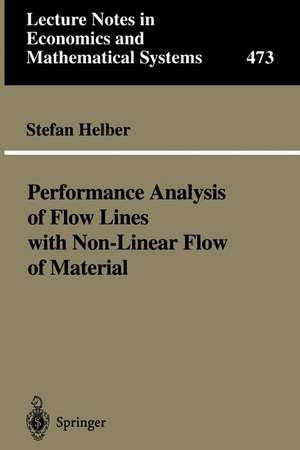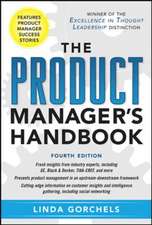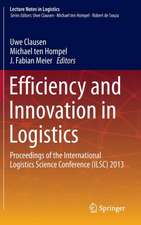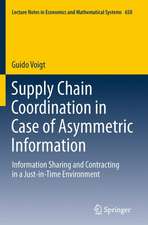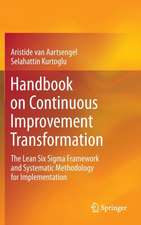Performance Analysis of Flow Lines with Non-Linear Flow of Material: Lecture Notes in Economics and Mathematical Systems, cartea 473
Autor Stefan Helberen Limba Engleză Paperback – 19 aug 1999
Din seria Lecture Notes in Economics and Mathematical Systems
-
 Preț: 360.02 lei
Preț: 360.02 lei -
 Preț: 383.93 lei
Preț: 383.93 lei - 15%
 Preț: 693.39 lei
Preț: 693.39 lei -
 Preț: 384.09 lei
Preț: 384.09 lei -
 Preț: 380.07 lei
Preț: 380.07 lei -
 Preț: 446.26 lei
Preț: 446.26 lei -
 Preț: 497.37 lei
Preț: 497.37 lei -
 Preț: 380.84 lei
Preț: 380.84 lei -
 Preț: 384.86 lei
Preț: 384.86 lei -
 Preț: 378.34 lei
Preț: 378.34 lei -
 Preț: 399.67 lei
Preț: 399.67 lei - 20%
 Preț: 360.93 lei
Preț: 360.93 lei - 15%
 Preț: 643.16 lei
Preț: 643.16 lei -
 Preț: 379.09 lei
Preț: 379.09 lei -
 Preț: 404.76 lei
Preț: 404.76 lei -
 Preț: 385.62 lei
Preț: 385.62 lei - 15%
 Preț: 644.49 lei
Preț: 644.49 lei -
 Preț: 379.09 lei
Preț: 379.09 lei -
 Preț: 345.50 lei
Preț: 345.50 lei -
 Preț: 425.80 lei
Preț: 425.80 lei -
 Preț: 378.34 lei
Preț: 378.34 lei - 18%
 Preț: 775.65 lei
Preț: 775.65 lei -
 Preț: 392.60 lei
Preț: 392.60 lei -
 Preț: 401.61 lei
Preț: 401.61 lei - 15%
 Preț: 646.43 lei
Preț: 646.43 lei -
 Preț: 382.18 lei
Preț: 382.18 lei -
 Preț: 378.34 lei
Preț: 378.34 lei - 15%
 Preț: 637.59 lei
Preț: 637.59 lei - 15%
 Preț: 647.27 lei
Preț: 647.27 lei -
 Preț: 377.73 lei
Preț: 377.73 lei -
 Preț: 447.84 lei
Preț: 447.84 lei - 15%
 Preț: 644.49 lei
Preț: 644.49 lei -
 Preț: 386.00 lei
Preț: 386.00 lei - 15%
 Preț: 654.43 lei
Preț: 654.43 lei -
 Preț: 415.02 lei
Preț: 415.02 lei -
 Preț: 411.54 lei
Preț: 411.54 lei -
 Preț: 398.92 lei
Preț: 398.92 lei -
 Preț: 398.92 lei
Preț: 398.92 lei -
 Preț: 392.75 lei
Preț: 392.75 lei - 15%
 Preț: 635.47 lei
Preț: 635.47 lei - 20%
 Preț: 653.56 lei
Preț: 653.56 lei -
 Preț: 379.86 lei
Preț: 379.86 lei -
 Preț: 495.46 lei
Preț: 495.46 lei -
 Preț: 447.99 lei
Preț: 447.99 lei -
 Preț: 378.71 lei
Preț: 378.71 lei - 15%
 Preț: 637.13 lei
Preț: 637.13 lei -
 Preț: 385.84 lei
Preț: 385.84 lei -
 Preț: 378.54 lei
Preț: 378.54 lei - 15%
 Preț: 666.55 lei
Preț: 666.55 lei
Preț: 387.96 lei
Nou
Puncte Express: 582
Preț estimativ în valută:
74.24€ • 79.38$ • 61.90£
74.24€ • 79.38$ • 61.90£
Carte tipărită la comandă
Livrare economică 18 aprilie-02 mai
Preluare comenzi: 021 569.72.76
Specificații
ISBN-13: 9783540659549
ISBN-10: 3540659544
Pagini: 292
Ilustrații: IX, 280 p.
Dimensiuni: 155 x 235 x 15 mm
Greutate: 0.41 kg
Ediția:Softcover reprint of the original 1st ed. 1999
Editura: Springer Berlin, Heidelberg
Colecția Springer
Seria Lecture Notes in Economics and Mathematical Systems
Locul publicării:Berlin, Heidelberg, Germany
ISBN-10: 3540659544
Pagini: 292
Ilustrații: IX, 280 p.
Dimensiuni: 155 x 235 x 15 mm
Greutate: 0.41 kg
Ediția:Softcover reprint of the original 1st ed. 1999
Editura: Springer Berlin, Heidelberg
Colecția Springer
Seria Lecture Notes in Economics and Mathematical Systems
Locul publicării:Berlin, Heidelberg, Germany
Public țintă
ResearchCuprins
1. Introduction.- 2. Issues, Goals, and Methods of Flow Line Analysis.- 2.1 Variability and the Performance of Flow Lines.- 2.2 Non-Linearities in the Flow of Material.- 2.3 Economic Design Problems in Flow Line Analysis.- 2.4 Methods of Performance Analysis.- 2.5 Two-Machine Decomposition of Flow Lines.- 2.6 Review of the Literature.- 3. Assembly/Disassembly Systems with Random Processing Times.- 3.1 Discrete and Continuous Time Models.- 3.2 Exact Solution of a Two-Machine Subsystem.- 3.3 Decomposition Equations for Assembly/Disassembly Systems.- 3.4 Two Algorithms to Determine Performance Measures.- 3.5 Numerical Results.- 3.6 Optimal Design of Assembly/Disassembly Systems.- 4. Flow Lines with Rework Loops and Identical Processing Times.- 4.1 Discrete-Material Flow Line Model with Identical Deterministic Processing Times.- 4.2 Decomposition Equations for Loops and Identical Processing Times.- 4.3 The Algorithm to Determine Performance Measures.- 4.4 Numerical Results: Algorithm and Flow Line Behavior.- 4.5 Optimal Design of Systems with Loops and Identical Processing Times.- 5. Flow Lines with Rework Loops and Machine-Specific Pro cessing Times.- 5.1 Continuous-Material Flow Line Model with Machine-Specific Processing Times.- 5.2 Decomposition Equations for Loops and Different Processing Times.- 5.3 The Algorithm to Determine Performance Measures.- 5.4 Numerical Results: Algorithm and Flow Line Behavior.- 5.5 Optimal Design of Systems with Loops and Different Processing Times.- 6. Conclusions and Suggestions for Further Research.- A. Derivation for the Discrete Material Flow Line.- B. Derivation for the Continuous Material Flow Line.- Glossary of Notation.
Caracteristici
Includes supplementary material: sn.pub/extras
